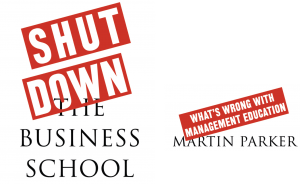Martin attempts through his research and writing to widen the scope of what is usually part of business and management studies, whether in terms of particular sorts of organisations (the circus, the worker co-op, Apollo space programme etc), or ways of representing organising (in art, cartoons, films etc).
His recent writing has been about ‘alternative’ organisation in two senses. One is work on co-operatives, worker self-management, alternative finance and so on. The other is on different ways of thinking about what ‘organisation’ means, so he has written about angels, shipping containers, art galleries, as well as a book on outlaws. His latest book is called ‘Shut Down the Business School’.
He moved to Bristol in 2018, after posts at Staffordshire, Keele, Warwick and Leicester Universities. His academic qualifications are in anthropology and sociology, and he likes making connections between management and other disciplines in the social sciences, arts and humanities. Pretty much everything he does is shaped by a sense of the politics of organizing and culture, and his sense that ideas about management always need to be analysed critically.

Down to business
Martin Parker asks whether business schools might be able to help address carbon capitalism, rather than simply teaching it. On Wednesday 3 June 1970, the Board of Social Studies at



